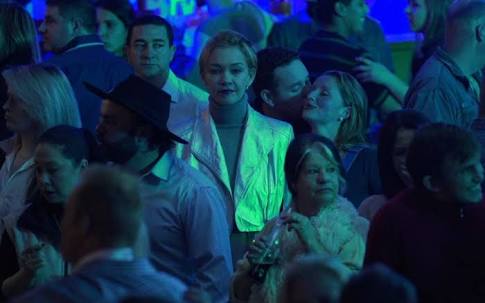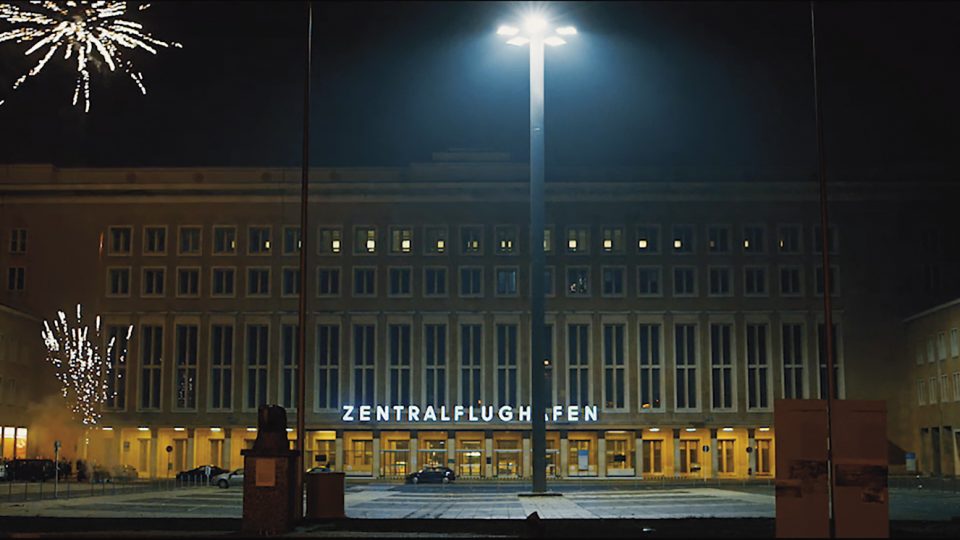
Cinema Tropical, New York’s top organization dedicated to promoting Latin American cinema, has announced Verão in New York summer program of Brazilian films, including LGBTQ Brazil, curated by Ela Bittencourt:
“On July 28 and 29, Museum of the Moving Image (MoMI) will present the special series ‘LGBTQ Brazil,’ programmed by Ela Bittencourt. Featuring a unique lineup of films, all of them in their New York premiere, the series showcases the flourishing and diverse LGBTQ cinema from the South American country. Highlights include Kiko Goifman and Claudia Priscilla’s Berlinale Teddy Award winner documentary Bixa Travesty on the self-described “gender terrorist” black trans pop singer Linn da Quebrada and Ismael Caneppele’s coming-of-age lesbian romance Music for When the Lights Go Out.”
Films in the LGBTQ Brazil program:
SATURDAY, JULY 28, 2:00 P.M. (Bartos Screening Room)
Total running time: 90 mins.
Terremoto Santo (2017, 20mins.)
Dirs. Bárbara Wagner and Benjamin de Búrca
Mixing observation and performance, Wagner and de Búrca draw upon the Evangelical faith’s musical, oral richness but also eerie social contradictions. The artists’ works have been exhibited in numerous shows in and outside Brazil, and nominated for the country’s main art prize, Prêmio Pipa.
Music for When the Lights Go Out (2017, 70 mins.)
Dir. Ismael Caneppele
This coming-of-age lesbian romance restages its young protagonist’s coming out and transformation, with the moral support from a professional actress. This charismatic hybrid explores the possibilities of an intimate digital camera, and mixes real-life situations and persons with fictional elements. Winner of the Art Doc award at Sheffield Doc/Fest.
SATURDAY, JULY 28, 4:30 P.M. (Bartos Screening Room)
Total running time: 95mins.
The Daytime Doorman (2016, 25 mins.)
Dir. Fábio Leal
In this situational dramedy, fraternity, fun and sex collide with social class and race. Leal charmingly toys with melodrama in this sensuous story of a white middle-class bon vivant, who picks up his building’s black doorman.
Sweet Amianto (2013, 70 mins)
Dirs. Uirá dos Reis and Guto Parente
After being ditched by her boyfriend, a transwoman finds comfort in fantasy. Opening with a quote from Walt Whitman and dedicated to Brazilian artist José Leonilson, who died of AIDS in 1993, this glam, psychedelic meditation on love, illness and betrayal is darkly funny and lyrical, a sensory acid trip.
SATURDAY, JULY 28, 7:00 P.M. (Bartos Screening Room)
Total running time: 115 mins.
Vando Vulgo Vedita (2017, 20 mins.)
Dirs. Leonardo Mouramateus and Andreia Pires
A group of friends meets at a local barbershop in Fortaleza and travels to the beach. Bodies and desires morph in a choreographed dance in the water, before we are summoned back to the streets, where real violence looms. Best Short at the Tiradentes Film Festival.
Sol Alegria (2018 95mins.)
Dir. Tavinho Teixeira
This satire, aimed at Brazil’s recent tide of conservatism and religion’s widening grip on political elites, celebrates the freeing power of sex and transgression. The film’s striking images and narrative bravado recall such Brazilian directors as Andrea Tonacci (particularly Bang Bang), Joaquim Pedro de Andrade (the picaresque Macunaíma) and the master of Brazilian horror, José Mojica Marins. Special Jury Prize at Olhar de Cinema, Brazil.
SUNDAY, JULY 29, 3:00 P.M. (Bartos Screening Room)
Total running time: 105 mins.
Sr. Raposo (2018, 23mins.)
Dir. Daniel Nosco
Based on a story of Nolasco’s real-life partner, this hypnotic short combines moments of terror and ecstasy, as it looks at a life lived with the HIV virus. A fetishistic fever dream, the film revolves around both, the mortification of flesh and its victorious, daily resurrection.
Passion of JL (2015, 82mins.)
Dir. Carlos Nader
A bittersweet swan song of Brazilian artist José Leonilson who died of AIDS in 1993, at the age of 36. Leonilson recorded his thoughts, fears and passions on a tape recorder. Nader creates a unique glimpse at this passionate, talented artist, in love with many men and, perhaps most of all, with the movies. Winner of É Tudo Verdade / It’s All True International Film Festival.
SUNDAY, JULY 29, 6 P.M. (Bartos Screening Room)
Total running time: 106 mins.
Heaven (2016, 10mins.)
Dir. Luiz Roque
In an apocalyptic future a “high-risk” population is under threat of deliberate contamination and forceful quarantine. The video was exhibited at the São Paulo Bienal in 2016. Roque’s other works have screened internationally, including in New York, at MoMA PS1, and at Kunsthalle, in Vienna. He has been nominated for Brazil’s top art prize, Prêmio Pipa.
We Are All Here (2017, 21 mins.)
Dirs. Chico Santos and Rafael Melim
Young transwoman, Rosa, doesn’t have much going for her except anger and grits. When she’s kicked out from home, and sees her entire community facing eviction, her anger boils over. Santos and Melim bring their community-theater skills to collaborate with real-life performer Rosa Luz, who shines in this cathartic piece with a touch of a music video.
Bixa Travesty (2018, 75 mins.)
Dirs. Claudia Priscilla and Kiko Goifman
The self-described “gender terrorist,” singer Linn da Quebrada is the star of this sympathetic and intimate documentary portrait, which goes behind the scenes of the performer’s radio show and highly charged stage acts. A film-manifesto about femininity and power, and an exorcism of hurt, Goifman’s film is delightfully tongue-in-cheek, yet also forcefully on-message.
LGBTQ Brazil program is being co-presented by MoMI and by Cinema Tropical

